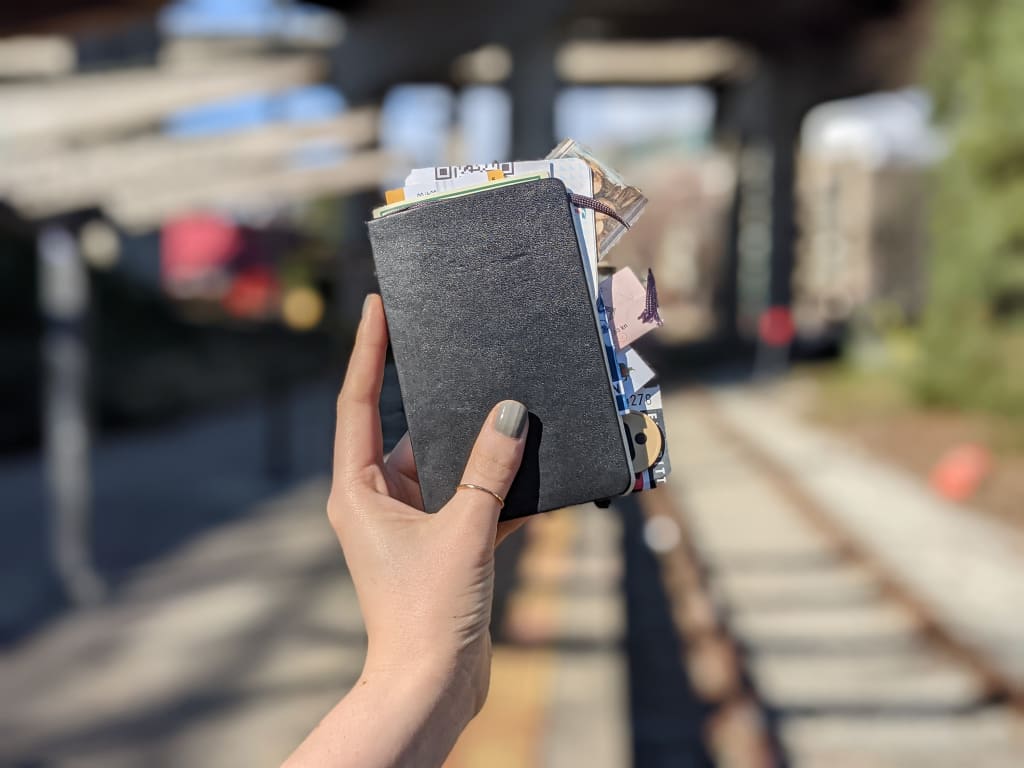
Inspired by a true Moleskine
...
The little black book arrives unannounced in a small seaside town, its pages empty — save for one.
The teacher burrows her head deeper into her winter jacket as the wind picks up. Only those with something important to do would expose themselves to such unseasonably cold weather, and the teacher is, unfortunately, one such person. Someone far away did something stupid, and now the teacher must undo it. That someone is the teacher’s friend. A stubborn, cheeky, stupid friend.
The teacher’s thoughts turn to the package as she approaches town. The pastel houses remind her of the colourful bundle of money weighing down her jacket. She tried to sort the bills back together as neatly as she’d received them, tightly wrapped in thick brown paper as plain as the package the money had arrived in that morning. The package that also contained an equally unremarkable small black notebook. The package with no return address. No sender.
Of course, she knew immediately who had sent the package, just as surely as she knew she couldn’t keep the money…though nothing stopped her from counting just how much money it was she wasn’t keeping.
She wonders how warm a jacket the price of a home in this town might feel as she uses both hands to pull open the frozen post office door.
...
Share the secret to happiness
The post office teller places the heavy brown paper bundle into a packing box as the teacher reads the instruction again, written in familiar hand on the first page of the little black book. For whatever else she could say about her friend —and she had said many things about them over years that had pushed the two far apart— she had always admired their weakness for theatrics.
She writes her friend’s address on the mailing slip and pays the teller. As the teacher exits the post office, the howling wind nearly blows her back inside. She shoves her hands into her jacket pockets, and realizes she’s taken the teller’s pen by mistake. With pen in one hand, the other still holding the little black book, she turns back around. As she does, a thought strikes her. A stupid thought.
The teacher opens the front cover of the book again, and a smile breaks the grip of cold on her face. She understands her friend’s instruction now.
...
The little black book arrives unannounced to a remote cottage home, its pages empty — save for two.
The builder presses redial, again. It’s barely after 7AM where he's calling, but extraordinary circumstances overrule the finer points of time zone etiquette. And for the builder, what’s arrived at his doorstep is rather extraordinary.
His first two calls didn’t go through, and neither does the third. Heart racing, he climbs out onto the roof, the way he knew he’d eventually need to when the phone’s reception first started acting funny months ago. The builder finds an abandoned bird’s nest wrapped around the satellite dish. Pieces of the nest are still airborne by the time the builder has pulled out his phone and hit redial again.
This time, the call completes. A groggy salutation is met with a breathless flurry of questions from the builder. The midday sun shines bright on him as he waits for the reply.
“Did you read the book?” asks the voice overseas. A flush shoots up his neck. In all the excitement, he had not, in fact, looked at the notebook that accompanied the money. He hurries back down to an empty dining room, where a wobbly table is weighed down by nearly £11,000.
He finds the little black book sitting at the bottom of the package it crossed the ocean in, unremarkable. The builder opens the notebook to where a string bookmark hangs out, only to find that it’s no bookmark, but instead a length of lavender yarn. Less phased by this discovery than he was by today's earlier surprises, the builder reads the words written on the page securing the string:
A warm embrace
The builder looks at the package. The delicate cursive shared by the notebook’s message and the package’s return address has the builder confident he’s solved one part of the mystery. His satisfaction wilts upon turning to the first page of the notebook:
Share the secret to happiness
The handwriting is unfamiliar, and the builder’s frustration grows as he hastily thumbs further, finding one blank page after another. Seeing nothing else in the package, he sits at the table and stares at the stack of pounds now partnered with the little black book. He thinks and thinks and thinks, and when he’s all thought out, he presses redial, again. The receiver clicks immediately.
“How much can I have?” he asks.
“As much as you want,” says the voice on the other end.
“Who gets it next?”
“Whoever you want.”
“And I have to follow the instruction?”
“Only if you want to.”
The builder puts down the phone and considers the possibilities. He turns on the kettle and looks around the dining room. He sees a table in disrepair, discoloured windows in need of replacement, and a stove that takes ages to heat the kettle. By the time the water has gone from cold to boiled and back again, he’s no more certain of what to do.
The trouble with life-changing opportunities is that you’re never sure whose life you’ll be changing into. And it’s awfully rude of an opportunity not to even ask you if you want to change in the first place.
It’s outside one of the discoloured windows that the builder spots something hovering in the fading light. In the time it takes for the figure to disappear, the builder entertains the first happy thought he’s had all day. He knows what he’d like to do with the money.
...
A week later, a package is heading east. Inside the package is 90,000 Kr, and a little black book that contains an instruction, a strand of lavender yarn, and a graph paper sketch of a birdhouse wedged next to a freshly written page that reads:
A home to call your own
The builder doesn’t receive a call from his associate out east, which doesn’t surprise him; the purpose of the little black book is now unmistakable, its instruction having transformed into an invitation to join a daft conspiracy. And the builder would know if someone called — his phone reception is much better these days.
...
For months, the little black book travels, always arriving unannounced, always departing with new words and a new memento stuffed between its pages. The objects are mostly trivial things. A train ticket; a classified ad; a lottery ticket marked with lipstick; a cut photobooth printout secured with stale gum where the middle photo ought to be; a sticky note that says “I’m sorry”. Those sorts of things.
The secrets the book records are just as obscure, a collection of statements, bromides, and a few bad puns. It’s hard to tell one from another; the meaning of the words is only ever really known to the one who wrote them.
But as each new conspirator reads the little black book, they find the mystery of its origin not nearly so compelling as any number of the smaller mysteries left by the book’s previous authors. The money changes shape and size, sometimes significantly, though no one is ever sure how much existed before they received it. Yet the little black book just keeps growing, heavier and heavier with every secret added to the conspiracy.
Until, one day, the little black book returns unannounced to a small seaside town.
...
The teacher loosens her scarf as she brings the package inside, the now-familiar wool hug never far from her neck, even amidst such unseasonably hot weather. Another familiar sight greets her as she reads the sender’s address on the package. The contents of the package, however, surprise her, despite also being familiar: it’s a little black book. A worn, stuffed, limp-spined little black book. And on the cover of the book is taped a torn piece of notepaper with three words:
Return to sender
...
“Why’d you send it back?” the teacher asks the man overseas.
“Because someone sent it back to me,” says the builder. His connection sounds better than usual — she can tell by the chirping coming from the background, and by the glee she detects in his voice as he asks:
“Did you read the book?”
Opening the cover of the little black book, the teacher begins to study every page and item. The instruction. The stray yarn. The birdhouse. The kiss for luck. The confession. She takes her time, feeling the objects held by each page, using her phone to translate the writing she can’t read.
She finds what she expects at the end: the little black book’s pages are full, save for the last – it’s been torn out. What she doesn’t expect is the phone number written on the inside back cover, one that, her own phone tells her, is still available for calling without disrespecting the finer points of time zone etiquette.
...
“It’s the sender,” the teacher says when she hears the voice on the other line. She’s thankful they answer in English, though she can’t place their accent. “I received your notebook.”
“Oh, that’s wonderful!” says the voice on the other end. “I’m so happy it found its way home.”
“Right,” says the teacher. “Did you finish the book?”
“Yes. It had quite the journey,” says the voice on the other end. “It’s a shame I couldn’t continue it, but I thought you ought to know how the story ended.”
“Right,” says the teacher, a feeling of guilt now creeping down her spine. “I hope you weren’t put out of pocket by sending this back to whoever you received it from.”
“It was nothing,” says the voice on the other end.
“Right,” says the teacher. She hopes that was the case for everyone else who did the same.
“I have to ask…why did you start this?” says the voice on the other end.
“I didn’t,” the teacher replies. “I’m just like you. A friend —a stupid friend, but a friend nonetheless— thought it’d be funny to send me $20,000 I never asked for.”
“Your friend sounds very generous.”
“Hardly!” says the teacher with a laugh. “See, we used to argue about everything, this friend and me. The way only good friends can while still staying friends. And I think this whole thing was their way of winning an old argument.”
“Which was?”
“That money makes people happy. I think they were challenging me to see if someone else could come up with a better answer. Looking through this book, I’d say they proved their point.”
“Maybe,” says the voice on the other end. “But I think a lot of those people weren’t suddenly happy because some money showed up — I think they found some happiness in trying to answer your friend’s challenge for themselves.”
“Maybe,” says the teacher.
“And at least you’re not alone,” says the voice on the other end.
“What do you mean?”
“I have the money here and it’s…well, if you’re calling from where I think you’re calling from, then it’s quite a bit more than $20,000.”
The teacher looks at the little black book expecting this news to change what she sees. Somewhere in its pages lies a conspiracy within a conspiracy, of a benefactor or benefactors just as generous and stupid as the teacher’s friend. But there’s no way of knowing who gave, or how much — the book isn’t telling. It just sits there, a little black book, unremarkable as ever.
“That’s why I was hoping you would call,” says the voice on the other end. “I don’t know what we’re supposed to do with the money once the story ends.”
“Well,” says the teacher, “could you use a new notebook?”
About the Creator
Sam Woolf
Author, traveler, and Oxford comma apologist based in Vancouver, Canada
Enjoyed the story? Support the Creator.
Subscribe for free to receive all their stories in your feed. You could also pledge your support or give them a one-off tip, letting them know you appreciate their work.






Comments
There are no comments for this story
Be the first to respond and start the conversation.